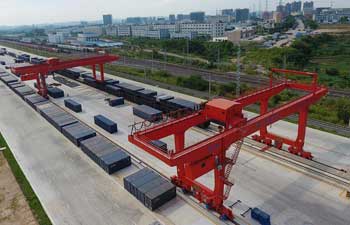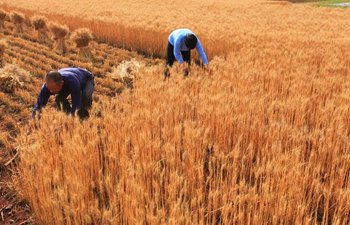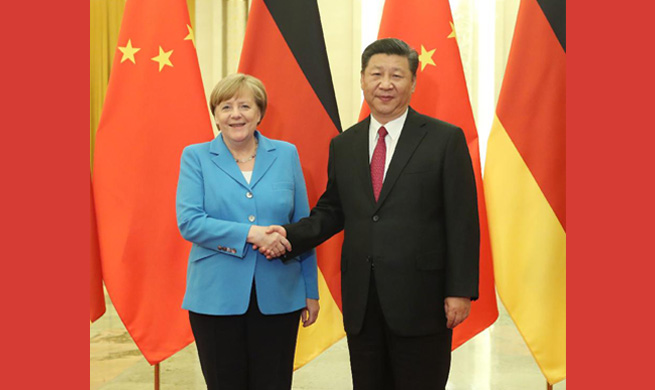BEIJING, May 24 (Xinhua) -- With a recent agreement reached by China and the United States on agricultural trade, China is expected to expand and diversify farm produce imports more actively to benefit itself and other countries.
China and the United States agreed to meaningfully increase the export of U.S. agricultural products, according to a joint statement issued Saturday by the two sides on economic and trade consultations.
This was a significant move to enrich domestic food supply and push for upgrading of the agricultural industry, analysts said.
To "meaningfully" increase China's agricultural imports from the United States means the measure should play a role in helping balanced development of bilateral trade, said Li Yong from China Association of International Trade.
"This is in the interests of both countries," he said.
Taking soybean imports as an example, Li said they will meet Chinese consumer demand for not just edible oil but also meat, as the imports could provide a stable source of animal feed protein.
"With insufficient and unbalanced domestic supply, moderately increasing imports is a sensible choice to optimize resource allocation globally," he said.
The United States is China's largest source of farm produce imports, accounting for 19 percent of the total value of the country's agricultural imports, according to Han Yijun, a researcher from China Agricultural University.
In 2017, China imported 24.1 billion U.S. dollars worth of farm produce from the United States, including soybeans, corn, and wheat, said Han.
"As one of the world's most dynamic food and farm produce markets, China offers great opportunities for various agricultural exporters amid its efforts to actively expand imports and facilitate trade," said Yu Lu, deputy head of China Chamber of Commerce of Foodstuffs and Native Produce.
To see how far China has come in opening up its agricultural sector, one could do worse than look into the refrigerators of ordinary Chinese consumers.
U.S. cherries, Australian beef, Chilean kiwifruit, German milk -- foreign farm produce items like these are increasingly common in China's urban homes.
China's farm produce imports and exports both hit record highs in 2017, with imports increasing 12.8 percent to reach 125.9 billion dollars and exports rising 3.5 percent to 75.5 billion dollars, official data showed.
The country's annual farm produce trade exceeded 200 billion dollars for the first time last year. It recorded a deficit of 50.3 billion dollars, up 30.4 percent.
China is already the world's biggest farm produce importer, with its imports making up 10 percent of global farm produce trade. It is a net importer of bulk agricultural products such as grains, cotton, edible oils, sugar, meat, and milk.
By opening up the agricultural sector, China can increase the supply of farm produce, ease the domestic strain of resources, accelerate modernization of the industry, and offer consumers tangible benefits, said Li Guoxiang, a researcher with Chinese Academy of Social Sciences.
"These advantages will strengthen China's determination to advance the opening-up," Li said. "This will present the rest of the world with more opportunities to compete in China's farm produce market."
Various high-quality products, including farm produce, from countries all around the world will be displayed at the China International Import Expo, the first of its kind, to be held in Shanghai in November this year.
China will push for "healthy development" of farm produce imports and adopt differentiated policies for different product categories, said an official with the Ministry of Agriculture and Rural Affairs.
While about 70 percent of China's agricultural imports come from the United States, Brazil, the Association of Southeast Asian Nations, the European Union, and Australia, rapid growth has been registered in imports from Belt and Road countries, said the official.
China will strengthen agricultural trade cooperation with nations along the Belt and Road, improving trade policies and expanding import channels, according to the official.

















